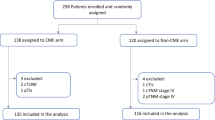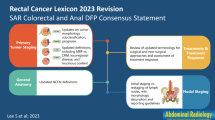Abstract
Background
Ideal treatment of rectal cancer includes controlling the cancer; minimizing trauma, morbidity, and mortality; and avoiding a colostomy with preservation of adequate function. These goals become more challenging the further distal in the rectum the cancer is located. We sought to determine whether minimally invasive sphincter-preservation surgery (SPS) can accomplish good cancer control, maintaining sphincter function with minimal morbidity and mortality in rectal cancers of the distal 3 cm after receiving neoadjuvant chemoradiotherapy.
Methods
We retrospectively reviewed a prospectively maintained rectal cancer database of a single colorectal surgeon to identify all patients with cancers of the distal 3 cm undergoing SPS via a laparoscopic total mesorectal excision or transanal endoscopic microsurgery (TEM). All patients received neoadjuvant chemoradiotherapy. Patient data, including demographics, initial tumor characteristics, staging, radiation dose, perioperative morbidity and mortality, and local recurrence (LR) and survival, were analyzed.
Results
A total of 161 patients (108 men) underwent SPS via 3 techniques: transanal abdominal transanal proctosigmoidectomy (TATA, n = 106), TEM (n = 49), or ultralow anterior resection (LAR, n = 6). Average age was 62 years (range 22–90 years). The mean levels in rectum from the anorectal ring were as follows: TATA, 1.3 cm (range −1.0 to 3.0 cm), TEM, 1.5 cm (range −0.5 to −3.0 cm), and LAR, 2.9 cm (range 2.5–3.0 cm) (p > 0.05). Preoperative T stage was as follows: T3, n = 108 (TATA 83, TEM 20, LAR 5), T2, n = 48 (TATA 22, TEM 25, LAR 1), T1, n = 3 (TATA 1, TEM 2), and T4, n = 2 (both TEM). All patients received concomitant 5-fluorouracil-based chemotherapy and radiotherapy (mean, 5300 cGy; range 3,000–7,295 cGy). The mean estimated blood loss was 376 ml (range 10–3,600 ml). There were no mortalities. Morbidity rates were as follows: LAR, 0; TATA, 13.2 %; and TEM, 32 % (wound disruption: major, 10 %; minor, 16 %). Pathologic staging was as follows: ypCR: uT2, 34 %, and uT3, 19 %. Overall LR was 3.7 %. By procedure, the follow-up, LR, and KM5YAS, respectively, were: TATA, 37.9 months, 3 and 95 %; TEM, 36.3 months, 6 and 88 %; and LAR, 63.1 months, 0 and 75 % (p > 0.05).
Conclusions
This study demonstrates positive oncologic outcomes, low LR rates, and high KM5YS after minimally invasive SPS. A colostomy-free lifestyle and cancer control make the minimally invasive surgical approach an excellent treatment option for complex distal rectal cancers.




Similar content being viewed by others
References
Marks GJ, Marks JH, Mohiuddin M, Bradley L (1998) Radical Sphincter-preservation surgery with coloanal anastomosis following high dose external irradiation for the very low lying rectal cancer. Recent Results Cancer Res 146:161–174
Heald RJ (1988) The “Holy Plane” of rectal surgery. J R Soc Med 81:503–508
Quirke P, Durdey P, Dixon MF, Williams NS (1986) Local recurrence of rectal adenocarcinoma due to inadequate surgical resection: histopathological study of lateral tumor spread and surgical excision. Lancet 2:996–999
Miles WE (1924) Discussion on the treatment of carcinoma of the rectum. Proc R Soc Med 17:79
Marks G, Mohiuddin M, Masoni L, Montori A (1992) High-dose preoperative radiation therapy as the key to extending sphincter preservation surgery for cancer of the distal rectum. Surg Oncol Clin N Am 1:71–85
Buess G, Theiss R, Gunther M, Hutterer F, Hepp M, Pichlmaier H (1984) Endoscopic operative procedure for the removal of rectal polyps. Coloproctology 84:254–261
Borschitz T, Heintz A, Junginger T (2007) Transanal endoscopic microsurgical excision of pT2 rectal cancer: results and possible indications. Dis Colon Rectum 50:292–301
Serra-Aracil X, Vallverdu’ H et al (2008) Long term follow up of local rectal cancer surgery by transanal endoscopic microsurgery. World J Surg 32:1162–1167
Sengupta S, Tjandra JJ (2001) Local excision of rectal cancer: what is the evidence? Dis Colon Rectum 44:1345–1361
Lezoche G, Baldarelli M, Mario, Paganini AM, DeSanctis A, Bartolacci S, Lezoche E (2008) A prospective randomized study with a 5-year minimum follow-up evaluation of transanal endoscopic microsurgery versus laparoscopic total mesorectal excision after neoadjuvant therapy. Surg Endosc 22:352–358
Guerrieri M, Baldarelli M, Organetti L, Grillo Ruggeri F, Mantello G, Bartolacci S, Lezoche E (2008) Transanal endoscopic microsurgery for the treatment of selected patients with distal rectal cancer: 15 years experience. Surg Endosc 2008(22):2030–2035
Lezoche E, Guerrieri M, Paganini AM, Baldarelli M, De Sanctis A, Lezoche G (2005) Long-Term results in patients with T2-3 N0 distal rectal cancer undergoing radiotherapy before transanal endoscopic microsurgery. Br J of Surg 92:1546–1552
Heimann TS, Oh C, Steinhagen RM, Greenstein AJ, Perez C, Aufses AH (1992) Surgical treatment of tumors of the distal rectum with sphincter preservation. Ann Surg 24:432–437
Hyams DM, Manounas EP, Petrelli N, Rockette H, Jones J, Wieand S, Deutsch M, Wickerham L, Fisher B, Wolmark N (1997) A clinical trial to evaluate the worth of preoperative multimodality therapy in patients with operable carcinoma of the rectum: a progress report of NSABBP R-03. Dis Colon Rectum 40:131–140
Wibe A, Syse A, Andersen E, Tretli S, Myrvold HE, Soreide O (2004) Oncologic outcomes after total mesorectal excision for cure of cancer of the lower rectum: Anterior versus abdominoperineal resection. Dis Colon Rectum 47:48–58
Kapitijin E, Marijnen CAM, Nagtegall ID, Putter H, Steup WH, Wiggers T, Rutten HJT, Pahlman L, Glimelius B, van Krieken JHJM, Leer JWH, Can de Welde CJH (2001) Preoperative radiotherapy combined with total mesorectal excision for resectable rectal cancer. N Engl J Med 345:638–646
Jorge J, Habr-Gama A (2007). “Anatomy and Embryology of the Colon, Rectum, and Anus.” The ASCRS Textbook of Colon and Rectal Surgery, p 1–22
Marks J, Valsdottir E, Rather A, Nweze I, Newman D, Chernick M (2010) Fewer than 12 lymph nodes can be expected in a surgical specimen after high-dose chemoradiation therapy for rectal cancer. Dis Colon Rectum 53:1023–1029
Shirouzu K, Isomoto H, Kakegawa T (1995) Sistal spread of rectal cancer and optimal distal margin of resection for sphincter-preserving surgery. Cancer 76:388–392
Kwok SP, Lau WY, Leung KL, Liew CT, Li AK (1996) Prospective analysis of the distal margin of clearance in anterior resection for rectal carcinoma. Br J Surg 83:969–972
Andreola S, Leo E, Belli F, Lavarino C, Bufalino R, Tomasic G, Baldini MT, Valvo F, Navarria P, Lombardi F (1997) Distal intramural spread in adenocarcinoma of the lower third of the rectum treated with total mesorectal excision and coloanal anastomosis. Dis Colon Rectum 40:25–29
Guillem JG, Chessin DB, Shia J, Suriawinata A, Riedel E, Moore HG, Minsky BD, Wong WD (2007) A prospective pathologic analysis using whole-mount sections of rectal cancer following preoperative combined modality therapy: implications for sphincter preservation. Ann Surg 245:88–93
Moore HG, Reidel E, Minsky BD, Saltz L, Paty P, Wong D, Cohen AM, Guillem JG (2003) Adequacy of 1-cm distal margin after restorative rectal cancer resection with sharp mesorectal excision and preoperative combined-modality therapy. Ann Surg Oncol 10:80–85
Nategaal ID, Van de Velde CJ, Marijnen CA, Van Krieken KH, Quirke P, Dutch Colorectal Cancer Group, The pathology review committee (2005) Low rectal cancer: a call for a change of approach in Abdominoperineal resection. J Clin Oncol 23:9257–9264
Rullier E, Laurent C, Bretagnol F, Rullier A, Vendrely V, Zerbib F (2005) Sphincter-saing resection for all rectal carcinomas: the end of the 2-cm distal rule. Ann Surg 241:465–469
Gerard JP, Conroy T, Bonnetain F, Bouche’ O, Chapet O, Closon-Dejardin MT, Untereiner M, Leduc B, Francois E, Maurel J, Seitz JF, Beucher B, Maciewicz R, Ducreux M, Vedenne L (2006) Preoperative radiotherapy with or without concurrent fluorouracil and leucovorin in T3-4 rectal cancers: results of FFCD 9203. J Clin Oncol 24:4620–4625
Harnsberger JR, Vernava VM III (1994) Longo WE, Radical abdominopelvic lymphadenectomy: historic perspective and current role in the surgical management of rectal cancer. Dis Colon Rectum 34:73–87
Phillips RK, Hittinger R, Blesovsky L, Fry US, Fielding LP (1984) Local recurrence following “curative” surgery for large bowel cancer. The overall picture. Br J Surg 71:12–16
Kapiteijn E, Marijnen C, Colenbrander AC et al (1998) Local recurrence in patients with rectal cancer, diagnosed between 1988 and 1992: a population-based study in the west Netherlands. Eur J Surg Oncol 24:5–28
Rullier E, Goffre B, Bonnel C, Zerbib F, Caudry M, Daric J (2001) Preoperative radiochemotherapy and sphincter-saving resection for T3 carcinomas of the lower third of the rectum. Ann Surg 234:633–640
Marks G, Mohiuddin M, Masoni L (1993) The reality of radical sphincter-preservation surgery for rectal cancer of the distal 3-cm rectum following high dose radiation. Int Radiat Oncol Biol Phys 27:779–783
Rouanet P, Fabre JM, Dubois JB, Dravet F, Saint AB, Pradel J, Ychou M, Solassol C, Pujol H (1995) Conservative surgery for low rectal carcinoma after high-dose radiation: functional and oncologic results. Ann Surg 221:67–73
Mohiuddin M, Regine WF, Marks GJ, Marks JW (1998) High-dose preoperative radiation and the challenge of sphincter preservation surgery for the distal 2 cm of the rectum. Int Radiat Oncol Biol Phys 40:569–574
Wagman R, Minsky BD, Cohen AM, Guillem JG, Paty PP (1998) Sphincter preservation in rectal cancer with preoperative radiation therapy and coloanal anastomosis: long-term follow-up. Int J Radiat Oncol Biol Phys 42:51–57
Swedish Rectal Cancer Trial (1997) Improved survival with preoperative radiotherapy in respectable rectal cancer. New Engl J Med 336:980–987
Crane CH, Skibber JM, Birnbaum EH, Feig BW, Singh AK, Delclos ME, Lin EH, Fleshman JW, Thames HD, Kodner IJ, Lockett MA, Picus J, Phan T, Chandra A, Janjan NA, Read TE, Myerson RJ (2003) The addition of continuous infusion 5-FU to preoperative radiation therapy increases tumor response, leading to increased sphincter preservation in locally advanced rectalcancer. Int J Radiat Biol Phys 57:84–89
Sauer R, Becker H, Hohenberger W, Rodel C, Wittekind C, Fietkau R, Martus P, Tschmelitsch J, Hager CF, Karstens JH, Liersch T, Schmidberger H, Raab R, German rectal cancer study group (2004) Preoperative versus postoperative chemoradiotherapy for rectal cancer. N Engl J Med 351:1731–1740
Stockholm Colorectal Cancer Study Group (1996) Randomized study on preoperative radiotherapy in rectal carcinoma. Ann Surg Onc 3:423–430
Roh MS, Colangelo K, Wieand S, O’Connell M, Petrelli N, Smith R, Mamounas E, Hyams D, Wolmark N (2004) Response to preoperative multimodality therapy predicts survival in patients with carcinoma of the rectum. J Clin Oncol 22:2505
Bosset JF, Collette L, Calais G, Mineur L, Maingon P, Radosevic-Jelic L, Daban A, Bardet R, Beny A, Ollier JC, EORTC Radiotherapy group trial 22921 (2006) Chemotherapy with peroperative radiotherapy in rectal cancer. N Engl J Med 355:1114–1123
Gerard J-P, Chapet O, Nemoz C, Hartweig J, Romestaing P et al (2004) Improved sphincter preservation in low rectal cancer with high-dose preoperative radiotherapy: the lyon R96-02 randomized trial. J Clin Oncol 22:2404–2409
Wagman R, Minsky B, Cohen A, Guillem J, Paty P (1998) Sphincter preservation in rectal cancer with preoperative radiation therapy and coloanal anastomosis: long term follow up. Int J Radiat Oncol Biol Phys 44(1):51–57
Crane C, Skibber K, Birnbaum E, Feig B et al (2003) The addition of continuous 5-FU to preoperative radiation therapyincreases tumor response, leading to increased sphincter preservation in locally advanced rectal cancer. Int J Rad Oncol BiolPhys 57(1):84–89
Habr-Gama A, Perez RO, Nadalin W, Sabbaga J, Ribeiro U Jr, Silva e Sousa AH Jr, Campos FG, Kiss DR, Gama-Rodrigues J (2004) Operative versus nonoperative treatment for stage 0 distal rectal cancer following chemoradiation therapy, long term results. Ann Surg 240(4):711–778
Marks J, Valsdottir E, DeNittis A et al (2009) Transanal endoscopic microsurgery for the treatment of rectal cancer: comparison of wound complication rates with and without neoadjuvant radiation therapy. Surg Endosc 23:1081–1087
Disclosures
John Marks, George Nassif, Henry Schoonyoung, Al DeNittis, Eric Zeger, Gerald Marks, and Mo Mohiuddin have no conflicts of interest or financial ties to disclose.
Author information
Authors and Affiliations
Corresponding author
Rights and permissions
About this article
Cite this article
Marks, J., Nassif, G., Schoonyoung, H. et al. Sphincter-sparing surgery for adenocarcinoma of the distal 3 cm of the true rectum: results after neoadjuvant therapy and minimally invasive radical surgery or local excision. Surg Endosc 27, 4469–4477 (2013). https://doi.org/10.1007/s00464-013-3092-3
Received:
Accepted:
Published:
Issue Date:
DOI: https://doi.org/10.1007/s00464-013-3092-3




